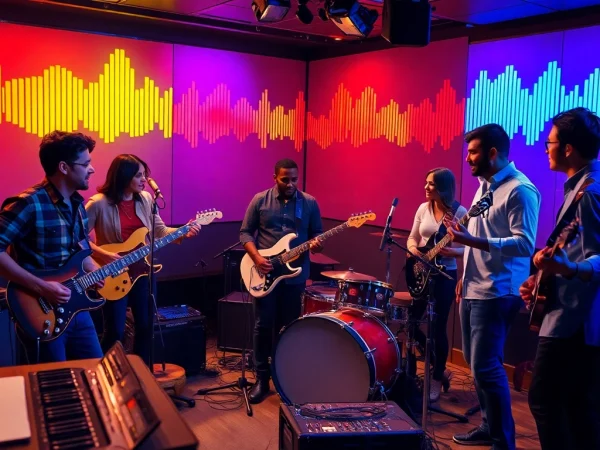Effective Strategies to Grow Audience Engagement in Live Events
Understanding Your Target Audience
To effectively grow your audience, it’s imperative to have a crystal-clear understanding of who your audience is. This understanding shapes all the strategies that follow and ultimately determines your success in engaging and expanding your community. By focusing on key demographics, analyzing behaviors, and developing audience personas, you can create tailored experiences that resonate deeply with your target market.
Identifying Key Demographics
Demographics encompass statistical characteristics of a population, including age, gender, income level, education, and location. Understanding these factors is crucial in tailoring your outreach and content. For instance, if your events cater specifically to young adults aged 18-24, your marketing should reflect the interests and platforms popular within that age group.
Tools like Google Analytics and social media insights can provide valuable data on who is engaging with your brand. Consider conducting surveys to gather direct feedback from your audience about their interests and preferences. Armed with this data, you will be better positioned to create compelling content that resonates with them. This approach lays the groundwork for your efforts to grow audience engagement effectively.
Analyzing Audience Behavior
Beyond demographics, understanding audience behavior is essential. Look into where your audience spends their time online, what content types they engage with, and their general preferences for interaction. This may include analyzing social media interactions, website traffic patterns, and event attendance. Behavioral analytics tools can help identify trends that might inform how you engage with your audience.
For example, if data shows your audience engages more with video content than blog posts, it may be worth investing more resources into creating high-quality videos that highlight your events or relevant topics. This analysis not only deepens your understanding of your audience but also enables you to tailor content delivery methods to enhance engagement.
Creating Audience Personas
Building audience personas is a strategic step in personalizing your approach. A persona represents a segment of your audience characterized by common traits, interests, and behaviors. This fictional representation helps you visualize and better understand your audience’s motivations and pain points.
When creating these personas, consider factors such as goals, challenges, preferred communication channels, and the type of content they find engaging. Conduct workshops or brainstorming sessions with your team to develop detailed personas. Once defined, ensure all marketing materials and event promotions align with these personas to foster stronger connections with your audience.
Leveraging Social Media to Grow Audience
Social media remains one of the most powerful tools for audience growth. With billions of users across various platforms, strategically leveraging social media increases your visibility and engagement. However, with numerous platforms available, it’s crucial to choose the right ones that align with your audience demographics.
Choosing the Right Platforms
Each social media platform has its unique user base and characteristics. For instance, Instagram and TikTok are popular among younger demographics, while Facebook still has a strong following among older users. To maximize your audience growth, focus your efforts on platforms where your target demographic is most active.
Once you’ve identified your primary platforms, it’s essential to tailor your content to suit the specific audience of each. For example, visual content works exceptionally well on Instagram, while LinkedIn is better for professional articles and networking within certain industries. This nuanced approach will lead to a more engaged audience.
Engaging Content Strategies
Engagement is key to building a loyal audience. Create content that encourages interaction, shares insights, and provides value. Infographic posts, behind-the-scenes videos, polls, and contests can stimulate interest and generate discussions among your followers.
Consider partnering with influencers relevant to your niche. They can take your message to established communities, enhancing trust and credibility. Collaborations can introduce your brand to new audiences, creating opportunities for organic growth.
Building Community and Interactivity
Beyond simply interacting with your audience, building a community around your brand can significantly increase audience loyalty. Encourage your audience to openly share their thoughts and experiences. Create exclusive groups or forums where fans can communicate and collaborate on projects related to your events.
Utilizing user-generated content can also foster a sense of community. Encourage your audience to share their experiences at your events and feature this content on your social media channels. This not only enhances engagement but also cultivates authenticity around your brand.
Optimizing Event Marketing for a Wider Reach
Event marketing can greatly enhance your visibility and audience growth. However, optimizing your event marketing strategies is essential to maximize reach and engagement. From compelling promotions to effective use of SEO, each component contributes to the overall success of your events.
Crafting Compelling Event Promotions
When promoting events, the messaging must be clear, exciting, and targeted. Use persuasive language to communicate the unique value your event offers. Highlight special guests, unique experiences, and exclusive content that attendees can expect.
Leverage various promotional channels, including email newsletters, social media ads, and partnerships with influencers. Consider creating countdowns and teaser campaigns to build excitement leading up to the event. Additionally, early bird specials and exclusive offers can drive initial ticket sales and boost interest.
Implementing SEO Best Practices
Search engine optimization (SEO) plays a crucial role in enhancing the visibility of your events online. Start by conducting keyword research to identify relevant keywords associated with your event. Use these keywords in your promotional content, event descriptions, and headlines.
Consider optimizing your event’s page for local searches if applicable. Utilize Google My Business to provide essential information about your event location, ensuring that potential attendees can easily find you online. Collaborating with other local businesses can also enhance your SEO efforts and drive more localized traffic to your events.
Utilizing Email Marketing Campaigns
Email marketing remains a powerful tool for reaching your audience directly. Develop targeted campaigns that focus on segments of your audience based on their interests and previous interactions with your events. Use compelling subject lines to increase open rates, and ensure the content is valuable and engaging.
Create a series of emails leading up to your event with updates, special promotions, and reminders. Post-event follow-up emails can help maintain engagement, gathering feedback and thanking attendees for their participation. This continued conversation fosters loyalty and paves the way for future events.
Innovative Technologies to Boost Audience Growth
The intersection of technology and audience engagement is a continually evolving landscape. Embracing innovative technologies can enhance the way you connect with your audience, creating memorable experiences that drive growth.
Virtual Events and Livestreaming Benefits
In a world where online presence is increasingly vital, virtual events and livestreaming are becoming mainstream strategies for audience engagement. They provide flexibility and accessibility, allowing your audience to participate from anywhere in the world. Consider hosting webinars, Q&A sessions, or livestreaming events to engage those who may not be able to attend in person.
Leveraging platforms like Zoom, Facebook Live, or YouTube can introduce your brand to a larger audience. These events can be recorded and repurposed as valuable content to share with those who missed it, extending the lifespan and reach of your event.
Augmented Reality and Audience Engagement
Augmented reality (AR) offers immersive experiences that can significantly enhance audience engagement. Utilizing AR in your events can create interactive experiences that attract and retain attention. Whether it’s allowing attendees to visualize products or interact with content in real-time, AR can add a memorable twist to your events.
Incorporating AR into your marketing strategies can differentiate you from competitors. Consider AR filters for social media promotions or AR-driven showcases during your events to foster engagement and virality.
Data Analytics for Audience Insights
Understanding your audience’s behavior and preferences is critical to tailoring your engagement strategies. Implementing data analytics can provide valuable insights into what content resonates, which events are most attended, and how audience preferences shift over time.
Utilize tools like Google Analytics, social media insights, and email marketing analytics to gather data on audience interactions. Regularly review this data to fine-tune your strategies, ensuring you remain aligned with your audience’s interests and needs.
Tracking and Measuring Audience Growth
Measuring the effectiveness of your strategies enables you to refine your approach continuously. By tracking performance metrics and audience engagement, you can pinpoint what is working well and what needs adjustment.
Key Performance Indicators for Events
Establishing key performance indicators (KPIs) is essential for measuring the success of your events. KPIs could include attendance numbers, ticket sales, engagement rates on social media, and feedback ratings from attendees. Choose metrics that align with your goals and provide insight into your audience’s response to your efforts.
A successful marketing strategy fosters continual improvements. Regularly evaluate these KPIs to gauge performance and identify areas for growth. This data-driven approach will lead to more strategic and impactful marketing efforts.
Tools for Monitoring Engagement
Various tools are available for monitoring engagement across different platforms. Utilize social media analytics to assess performance across platforms, focusing on engagement rates, shares, and comments. This data can inform your content strategy and help you identify high-performing posts to replicate.
Email marketing platforms offer insights on click rates, open rates, and conversion metrics, providing a clear picture of your campaign’s effectiveness. Use these insights to enhance future campaigns, ensuring each interaction is as impactful as possible.
Iterating Strategies Based on Feedback
Feedback from your audience is invaluable. Consider implementing post-event surveys to gather insights directly from attendees about their experiences. Analyze this feedback to identify strengths and areas requiring improvement.
Incorporating audience feedback into your strategies demonstrates that you value their opinions and are committed to enhancing their experience. Use this information to adjust your marketing approaches, ensuring that you continually meet their expectations and desires.





